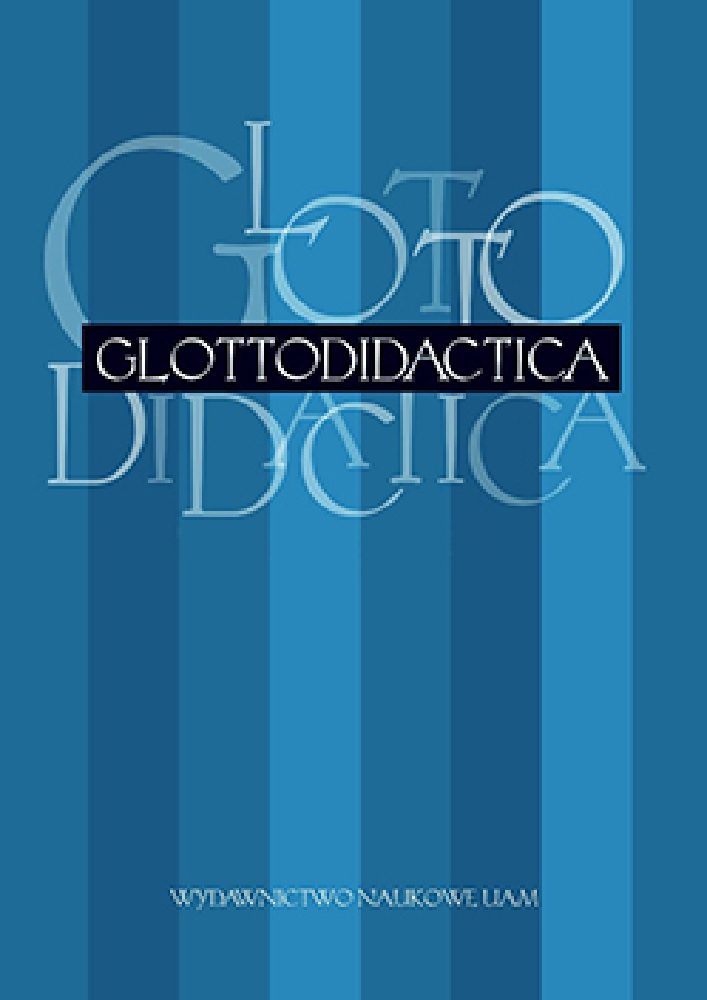Résumé
This paper focuses on the emergency communication of German paramedics who are learning Polish as a foreign language. This is to be tested in a role play, in which speech acts occur. Can the recorded speech acts or certain pragmatic phenomena be used in foreign language teaching of emergency communication? The study shows that the majority of patients’ responses are understood by the paramedics, but they respond to them inappropriately. Therefore, it is concluded that language courses for paramedics should focus much more on fixed phrases in Polish. The analysis of the recordings shows that this would enable them to formulate their answers in Polish, and not in German or English. In addition, code-switching sequences were used as means to identify the areas where there is a need for a modification of the programme and exercises during the lessons. The emphasis should lie on non-medical answers to the patient’s linguistic actions as well.
Références
Albert, R. / Koster, C.J. (2002). Empirie in Linguistik und Sprachlehrforschung: ein methodologisches Arbeitsbuch. Tübingen: Narr.
Appel, R. / Muysken, P. (1987). Language contact and bilingualism. London: Arnold.
Auer, P. (1988). A conversation analytic approach to code-switching and transfer. In: M. Heller (Hrsg.), Codeswitching: Anthropological and sociological perspectives (S. 187–213). Berlin: Mouton de Gruyter.
Bechmann, S. (2014). Sprache und Medizin: interdisziplinäre Beiträge zur medizinischen Sprache und Kommunikation. Berlin: Frank & Timme Verlag für wissenschaftliche Literatur.
Blom, J.-P. / Gumperz, J.J. (1972). Social meaning in linguistic structure: Code-switching in Norway. In: J.J. Gumperz / D. Hymes (Hrsg.), Directions in sociolinguistics (S. 407–434). New York: Holt, Rinehart & Winston.
Brehmer, B. (2018). Polnisch als Nachbarsprache in Deutschland. Polski w Niemczech – Pismo Federalnego Związku Nauczycieli Języka Polskiego / Polnisch in Deutschland – Zeitschrift der undesvereinigung der Polnischkräfte. Numer specjalny / Sondernummer, 21–36.
Gębal, P.E. (2016). Od dydaktyki tekstów specjalistycznych do dydaktyzacji potrzeb i działań komunikacyjnych. Kierunki i koncepcje glottodydaktyki specjalistycznej. Acta Universitatis Lodziensis. Kształcenie Polonistyczne Cudzoziemców, 23, 19–33.
Gumperz, J.J. (1982). Discourse strategies. Cambridge: Cambridge University Press.
Hryniewicz, J. / Lisek, G. (2019). Nauka języka sąsiada: od kształcenia przedszkolnego do zawodowego. Rozwiązania dydaktyczne i organizacyjne na Pomorzu Przednim. In: K. Zioło-Pużuk (Hrsg.), Panorama glottodydaktyki polonistycznej. Wyzwania, pytania, kierunki (S. 149–162). Warszawa: Wydawnictwo UKSW.
Illés, B. / Kegyes, I. (2019). Die Rolle der Simulation im Fachsprachenunterricht. In: E. Kegyes / R. Kriston / M. Schönenberger (Hrsg.), Sprachen, Literaturen und Kulturen im Kontakt. Beiträge der 25. Linguistik- und Literaturtage, Miskolc / Ungarn, 2017 (S. 117–126). Hamburg: Verlag Dr. Kovač.
Kiesendahl, J. (2011). Status und Kommunikation: ein Vergleich von Sprechhandlungen in universitären E-Mails und Sprechstundengesprächen. Berlin: Schmidt.
Klčova, R. (2019). Die simulierte Hauptverhandlung im Spannungsfeld von linguistischer und juristischer Dimension. In: E. Kegyes / R. Kriston / M. Schönenberger (Hrsg.), Sprachen, Literaturen und Kulturen im Kontakt. Beiträge der 25. Linguistik- und Literaturtage, Miskolc / Ungarn, 2017 (S. 127–132). Hamburg: Verlag Dr. Kovač.
Mroczynski, R. (2014). Gesprächslinguistik: eine Einführung. Tübingen: Narr.
Prokop, I. (1995). Erotetische Sprechakte im Deutschen und im Polnischen anhand natürlicher Gespräche. Poznań: Wydawnictwo Naukowe UAM.
Riehl, C.M. (2014). Mehrsprachigkeit: eine Einführung. Darmstadt: WBG.
Roche, J. (2013). Fremdsprachenerwerb – Fremdsprachendidaktik. Tübingen, Basel: Francke.
Rothmann, J. (2011). L3 syntactic transfer selectivity and typological determinacy: The typological primacy model. Second Language Research, 27, 107–127.
Searle, J.R. (1997). Sprechakte: ein sprachphilosophischer Essay. Frankfurt a. M.: Suhrkamp.
Spranz-Fogasy, T. / Becker, M. (2015). Beschwerdenexploration und Diagnosemitteilung im ärztlichen Erstgespräch. In: A. Busch / T. Spranz-Fogasy (Hrsg.), Handbuch Sprache in der Medizin (S. 93–115). Berlin, Boston: De Gruyter.
Stemmler, J. / Hecker, U. (2017). Notfallkommando Kommunikation in Notfallsituationen für Gesundheitsberufe. Berlin, Heidelberg: Springer.
Szerszeń, P. (2014). Platformy (glotto)dydaktyczne. Ich implementacja w uczeniu specjalistycznych języków obcych. Warszawa: Wydawnictwo Naukowe Instytutu Kulturologii i Lingwistyki Antropocentrycznej.
Thun von, Sch. (1998). Miteinander reden 1. Reinbek bei Hamburg: Rowohlt-Taschenbuch-Verl.
Zschäbitz, E. (2013). Web 2.0 to nic strasznego. Rozwijanie kompetencji językowych za pomocą internetowych narzędzi edukacyjnych. Polski w Niemczech – Pismo Federalnego Związku Nauczycieli Języka Polskiego / Polnisch in Deutschland – Zeitschrift der Bundesvereinigung der Polnischkräfte, 1, 44–52.
Licence
 This work is licensed under a Creative Commons Attribution-NoDerivatives 4.0 International License.
This work is licensed under a Creative Commons Attribution-NoDerivatives 4.0 International License.
Authors
Authors of texts accepted for publication in Glottodidactica are required to complete, sign and return to the Editorial team’s office the Agreement for granting a royalty-free license to works with a commitment to grant a CC sub-license.
Under the agreement, the authors of the texts published in Glottodidactica grant Adam Mickiewicz University in Poznań a non-exclusive, royalty-free license and authorize the use of Attribution-NoDerivatives 4.0 International (CC BY-ND 4.0) Creative Commons sub-license.
The authors retain the right to the free disposal of the work.
Users
Interested Internet users are entitled to use works that have been published in Glottodidactica since 2016, under the following conditions:
▪ attribution – obligation to provide, together with the distributed work, information about the authorship, title, source (link to the original work, DOI) and the license itself.
▪ no derivatives – the work must be preserved in its original form. Without the author's consent, it is not possible to distribute the modified work in the form of translations, publications, etc.
Copyrights are reserved for all texts published before 2016.
Miscellaneous
Adam Mickiewicz University in Poznań retains the property right as a whole (layout, graphic form, title, cover design, logo etc.).
Privacy statement
The names and email addresses published on this journal site will be used exclusively for the purposes declared by this journal and cannot be used for any other purpose or by any other party.





